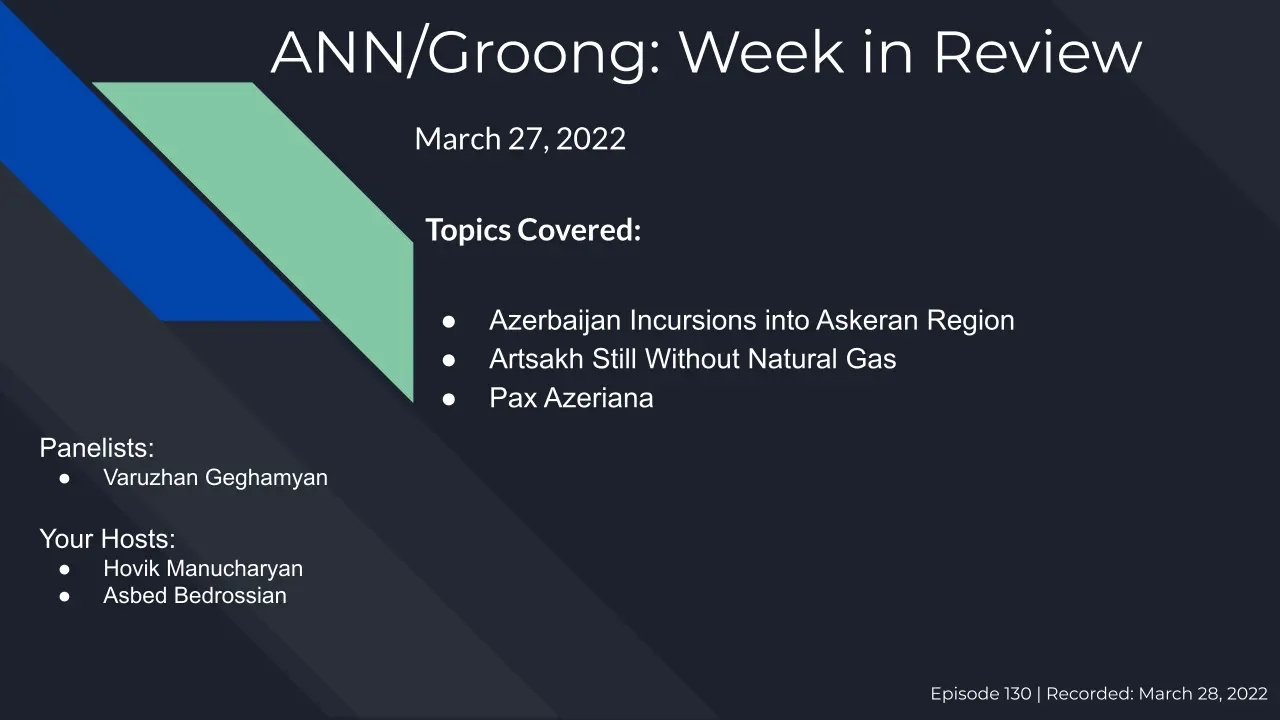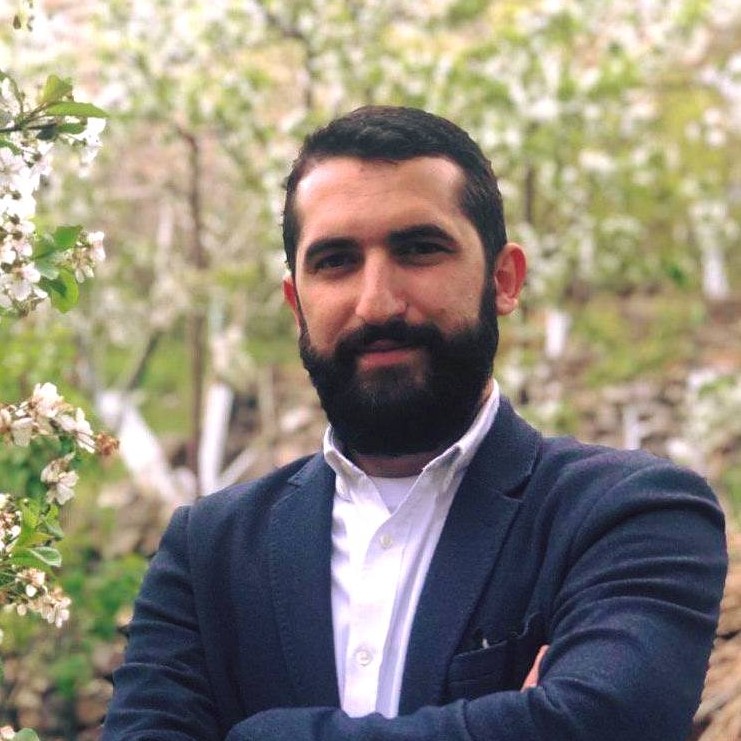Armenian News: Askeran Incursion | Artsakh Still Without Gas | Pax Azeriana | Ep. 130 - Mar 27, 2022 [EP130]
Posted on Monday, Mar 28, 2022 | Category: Armenia, Artsakh, Azerbaijan | Series: WIR
Armenian News Network/Groong Week in Review - March 27, 2022
Topics:
- Introduction
- Azerbaijan Incursions into Askeran Region
- Artsakh Still Without Natural Gas
- Pax Azeriana
Guest:
Episode 130 | Recorded: Monday, March 28, 2022
Show Notes
Azerbaijan Incursion into Askeran Region
As we covered last week, Artsakh is still without gas, despite it being restored for less than 3 days last weekend, only to be turned off again. But this week’s problems overshadowed last week’s problems.
First, let’s talk about the Azerbaijani armed forces again breaking the November 2020 Agreement, and advancing into Russian peacekeeper-controlled areas of Askeran, in the east of Artsakh. The enemy used Bayraktar drones and heavy artillery in their attacks which killed 3 and injured over 14 Armenians. Azerbaijani forces are reported to have taken the village of Parukh and also partly occupied a nearby strategic height called Karaglukh. Women and children have been evacuated from the nearby village of Khramort. We’ve previously reported that the village of Khramort has been the object of continuous harassment since a month ago, with Azerbaijan threatening the citizens of the village with megaphones (including blasting islamic prayers multiple times a day). There were even reports of actual fighting in that village where there was documented use of mortars by Azerbaijan.
So, amidst all this what was Armenia’s response? Some strong statements may have been made. In actuality, Armenian officials said that this is an area of Russian responsibility and asked the peacekeepers to demand rectification. Meanwhile, Andranik Kocharyan, head of the Defense and Security Committee in the Armenian parliament, said that “we should learn to live with the gas turned off”!
The US State Department has expressed “deep concern” about Azerbaijani troop movements, and both Russia and France have demanded that Azerbaijan return to previous positions.
As of late Sunday, March 27, the Russian peacekeepers reported that Azerbaijani forces have withdrawn from Parukh village, but Armenian sources report that the strategic height Karaglukh is still partially occupied. Meanwhile, the Azerbaijani MOD denied that they had withdrawn, essentially accusing the Russians of lying, and also ruled out such a move in the future. They also accused Russia of violating the declaration on “Allied relations” signed by the presidents of both countries in February of this year.
Artsakh president Arayik Harutyunyan applied to Putin to increase the number of peacekeepers, in order to assure the safety of Artsakh citizens.
Questions:
- How did this incident originate? Does this appeal to Putin help?
- Is Aliyev being opportunistic in light of the Ukraine crisis taking all of Russia’s attention, or is this a strategic move on their part?
The Russian response was uncharacteristically blunt in its daily bulletin, blaming the Azerbaijani side for the initiation of aggression and appealing to Azerbaijan to withdraw troops to their starting positions.
Questions:
- We’re used to seeing world powers express “serious concern” but, in your opinion, is Russia’s response different this time? And why?
- What are the possible outcomes here?
- Does Armenia have any leverage that it can pull? For example, could it message Turkey that such actions by Azerbaijan harm the Normalization process, and to help stop them?
In light of these border skirmishes and deadly incursions by Azerbaijan, I wanted to add an issue which we didn’t get to in our show last week, about the border community of Nerkin Hand in Syunik which complained that Azerbaijani armed forces had moved over half a kilometer deeper into Armenia. Defense Minister Papikyan visited Syunik, and dismissed the claims, and the ministry said this:
* “...Azerbaijani servicemen had simply returned to the positions that they previously controlled, but recently had to leave temporarily due to harsh winter conditions.”
This is all in Armenian territory!
The other reason for Papikyan’s visit was the death of two servicemen in non-combat situations. One of them may have been “forced to commit suicide”.
Questions:
- What is the situation near Nerkin Hand, and what is the situation of our Armed forces in Syunik?
- Should we expect any outcome from Papikyan’s visit to Syunik?
Artsakh Still Without Natural Gas
Since March 8, Artsakh has been without Natural Gas. We talked about this last week, and the problem remains. Fortunately, after the previous week’s terrible snowstorm and freezing weather, the weather has warmed up a little bit, but in Artsakh the weather is a real factor due to the mountainous terrain.
On Tuesday, Artsakh, and also Freedom House stated that there’s a real humanitarian crisis brewing there, as the situation and living conditions deteriorate. The EU expressed concern about the continuing disruption and made a meaningless statement calling on “the authorities in control” to resume gas service. I guess the EU doesn’t know who interrupted the gas to Artsakh’s population.
Russia called for the immediate resumption of the gas service, but the statement asked “Armenia and Azerbaijan to resolve the issue of the gas supply”.
So that’s where we stand today. This would have been our top issue today because it is stopping not only heating of peoples’ homes in current freezing temperatures, but also businesses, bakeries, the food supply, and hospitals. But the situation has been so aggravated with the Azeri attacks on Askeran, killing Armenians, etc. that this is our second topic!
Artsakh president Arayik Harutyunyan on Thursday claimed to have authorized Vitaly Balasanyan to negotiate with Azerbaijan to restart the gas service. Vitaly Balasanyan’s team has rejected this claim, after which the statement on the Artsakh’s Unified Info Center site was altered to omit this issue.
Questions:
- Why was Balasanyan’s name thrown in the fray, especially since it apparently was later corrected and removed?
Azerbaijan has repeatedly said that gas deliveries to Stepanakert are within the purview of Azergas and that Stepanakert authorities should apply to Baku to get their gas fixed. It is obvious that they’re interested in asserting control over communications and energy going to Artsakh and we can expect such threats and extortion to affect electricity or even telecommunications. It seems that the only way Artsakh citizens can be free from such threats in the future is to reroute gas, electric and telecom wires to bypass areas controlled by Baku forces.
Questions:
- Is that even feasible?
- What are the logistics involved?
Pax Azeriana
At this point it was a couple of weeks ago when we learned of the Azeri proposal for a 5-point “peace plan”. This past week FM Mirzoyan told the parliament that the Azeri peace plan was basically an acceptable starting point for Armenia, but it didn’t include all of Armenia’s needs.
Questions:
- How is the Azeri “peace plan” acceptable for Armenia, and what is missing from it?
- Does Pashinyan’s government see any outcome that allows for Artsakh’s self-determination, or any status that does not leave it within Azerbaijan?
Topics from the Panelists
- Varuzhan: A critical moment in time for Armenia
Wrap-up
We hope you found our Week in Review helpful. We invite your feedback and your suggestions, you can find us on most social media and podcast platforms. Thanks to Laura Osborn for the music on our podcasts.
Guests

Varuzhan Geghamyan
Prof. Varuzhan Geghamyan is assistant professor at Yerevan State University’s Department of Oriental Studies, teaching courses on Turkey’s modern history, History of Azerbaijan; Sociocultural anthropology of Azerbaijan; Political ideologies and parties in Modern Turkey & History of the Turkish Republic.
Hosts

Hovik Manucharyan
Hovik Manucharyan is an information security engineer who moved from Seattle to Armenia in 2022. He co-founded the ANN/Groong podcast in 2020 and has been a contributor to Groong News since the late 1990s.
Disclaimer: The views expressed by Hovik Manucharyan on the ANN/Groong podcast are his own and do not necessarily reflect the opinions of his employer or any other organization.

Asbed Bedrossian
Asbed is founder of the Armenian News Network Groong and co-founder of the ANN/Groong podcast.